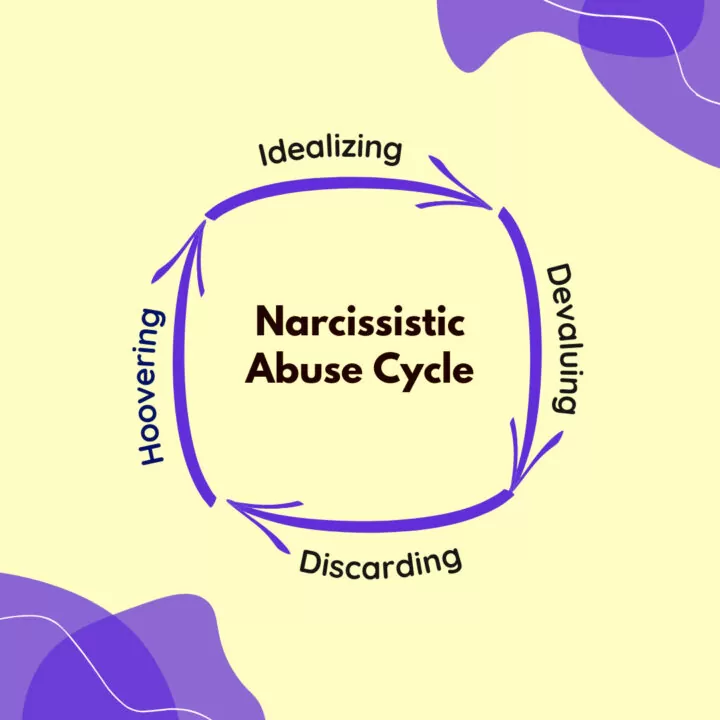Today's Thursday • 10 mins read
— By Dr. Sandip Roy.
The narcissistic abuse cycle unfolds in four stages.
You can spot shifts in their behavior at the ends of these stages, if you know what to look for.
If you don’t learn to see the pattern, they will trap you deeper. To a point when you cannot think for yourself until you’ve met their needs and demands.
The main purpose of this is to help you identify which stage you are in, so you can leave the narcissist, even when you have no money.
Read on to get insights into the destructive patterns of narcissistic cruelty, so you might break free.
Narcissistic Abuse Cycle
- Narcissistic abuse cycle is a recurring sequence of behavior shown by a person with narcissistic tendencies in their relationships.
- The design of the relationship traps an unsuspecting victim into a relationship and then causes them severe and lasting emotional damage.
- Each cycle goes through four stages, in this order — idealization, devaluation, discard, and hoovering (IDDH).
- The victim or survivor can be left with intense feelings of hopelessness, helplessness, self-doubt, anxiety, hypervigilance, and other trauma responses.
Most narcissists act too self-important, feel unreasonably entitled, demand admiration, and lack empathy, even though only some of them have a diagnosed Narcissistic Personality Disorder (NPD).

How The Narcissistic Abuse Cycle Unfolds: 4 Stages (IDDH)
The narcissistic abuse cycle typically unfolds in these four stages:
- I — Idealization (1st stage)
- D — Devaluation (2nd stage)
- D — Discard (3rd stage)
- H — Hoovering (4th stage)

1. Idealization (First Stage)
The first stage of the narcissistic abuse cycle is idealization, their love-bombing phase.
This is the stage where the narcissist puts their partner on a pedestal, showering them with compliments, love, and attention.
They may seem like the perfect partner, and the victim may feel like they have finally found true love.
“The love blitz at the beginning was intense. Constant texts, long calls, deep discussions, lots of gifts, he even wrote a song about me and had his bandmates help him record it. Introduced me to his friends, family, parents within a month of us deciding to actually start dating. It was a whirlwind. He called me his soulmate. Declared his love for me.”
— Covert Narcissist Info (Insta)
If you look closely, during this stage, narcissists may make you feel guilty for spending time with other people in your social circle. And they will often violate your boundaries and personal space.
2. Devaluation (Second Stage)
The second stage of the narcissistic abuse cycle, devaluation, is when the narcissist begins to tear their partner down, criticizing their behavior, appearance, and opinions.
It can include periodic shows of unexplained hostile behavior, deliberate gaslighting, demands for obedience, bitter criticism, physical assaults, abandonment, and tries to isolate the victim socially from her friends and family.
A narcissist can falsely pin actions on you and then force you to accept that you did them until you begin to question your own recollection of events. This form of psychological manipulation is called narcissistic gaslighting.
Gaslighting can make you start to doubt your own memory and question your sanity.
This sudden degradation of behavior may leave the victim confused and shocked.
To make the narcissist go back to their caring and loving character, the victim may act more compliant and flirtatious, but in vain.
Some of the ways that narcissists devalue their victims are:
- Stonewalling
- Name-calling
- Veiled criticism
- Passive-aggressiveness
- Ridicule and humiliation
- Comparisons with others
- Backhanded compliments
- Excuses for their bad behavior
- Lack of empathy and validation
- Mind games that seem harmless
- Zero-Sum or Zero-Win situations
Some narcissists are extremely cruel and physically aggressive during the devaluation stage.
“The minute I expressed an opposing opinion or a dislike of something he did, was the minute the devaluing started. Then the threats like him saying he had one foot out the door, or he’s going to flake on our relationship started. I’d be given the silent treatment, only for the love blitz to return stronger. Then, the rules: I was not allowed to discuss my feelings because unless he felt the same way, I was wrong. I could never get truly close to him because his mood could change on a dime. He’d tell me I deserved him one day; the next, he’d say I was almost perfect. This alters your brain chemistry. The chaos is addicting. It takes a traumatic event to shake you loose.”
— Unknown, on Facebook
3. Discard (Third Stage)
The third stage of the narcissistic abuse cycle is the discard or rejection.
The narcissist may simply end the relationship without any explanation, leaving the victim feeling confused, discarded, and abandoned.
Another way the narcissist behaves in this stage is by ghosting, which is when they simply disappear without any explanation and become incommunicado.
The victim is left feeling unworthy of the narcissist. They may begin to doubt their self-worth and may succumb to overthinking and despair.
A narcissist’s victim in the discard stage often blames themselves, “He left me because I wasn’t good enough. I’m not good enough for anyone. I am good for nothing.”
A 2017 study found:
- People with NPD are successful in short-term relationships (like dating and early-stage partnerships), but have difficulties maintaining long-term partnerships.
- In short-term relationships, they are driven by Admiration.
- In long-term relationships, they are driven by Rivalry.
Narcissistic Rivalry is a narcissist’s tendency to “inferiorize” others and make themselves seem superior. It protects them from building a negative self-view (antagonistic self-protection).

Narcissists inferiorize others by belittling, criticizing, making condescending remarks, highlighting someone’s flaws, or making unfavorable comparisons that point out their shortcomings.
“Now, the ending: I was suddenly pushed aside, as though my worth had vanished overnight. One day I was the center of his world, and the next, I was an afterthought. It felt as if he had discarded me like a used object. I tried to understand what went wrong, but his coldness was unfathomable. I was given silent treatments, and my attempts to reconnect were futile. It was a harsh awakening. The realization hit me hard, like a freight train. It’s a cruel twist, a harsh departure from all those promises of undying love. There are moments of intense pain, days of confusion, but there’s also a growing sense of freedom. Gradually, I start to regain my self-worth.”
4. Hoovering (Fourth Stage)
The final stage of each narcissistic abuse cycle is hoovering.
Hoovering is the narcissist’s way to try to return you into the relationship, promising to change and promising to never hurt you again.
They might put up a miserable figure of themselves missing you. You may take their promises as genuine and consider going back to them.
They may move you by their pitiful state and push you into deciding to return. To sway your opinion further, they will restart their idealization.
Then, when you begin to feel secure in the relationship, they will start to devalue you again, and you will find yourself caught in the painful phase of the narcissistic abuse cycle once again.
“And then, the comeback: Just when I thought I was finally free, there he was, trying to sweep me back into his chaotic world. His messages and calls were persistent, as if nothing had happened. He seemed to have transformed back into the charming person I first met. Apologies, promises of change, grand gestures — it was a whirlwind of manipulation. It was almost tempting, like a moth drawn to a flame. But, I had been through this before. I recognized the pattern, the ploy to reel me back into the cycle of abuse. It was a struggle, a tug between my heart and my mind. But I stood firm, reminding myself of the pain, the heartache. I saw through the smokescreen and recognized his actions for what they truly were — a desperate attempt to regain control.”
See these Cunning Narcissist Hoovering Tactics.
What are the long-term effects of narcissistic abuse?
Once a victim is free from the narcissist’s trap, the withdrawal symptoms start. During this, they can feel helpless, unable to decide even little things, needing someone to validate their actions.
Years of narcissistic abuse cycles may continue to devastate you long after the relationship is over.
Long-term effects of narcissistic abuse may include:
- A mental fog made up of confusion, indecision, shame, guilt, low self-esteem, and helplessness.
- A niggling self-doubt whether they were the wrong person in the narcissistic relationship.
- Feeling pity for the narcissist’s condition and guilt for misinterpreting their illness as abuse.
- Painful self-battles to stop themselves from going back to the narcissist.
- Victims may need psychological counseling to recover from emotional trauma and to rebuild their self-esteem and confidence.
Over many months, the mental fog gradually clears, letting the victim see the narcissist for what they are.
What makes it hard to leave a narcissist?
Victims often feel trapped in narcissistic relationships, unable to leave, because the narcissist has set up a trauma bond with them, creating an addiction-like emotional attachment and psychological dependence.
Trauma bonding makes the victim distrust their own ability to live and function independently without the narcissist. It also keeps them hoping that their abuser will change to become compassionate, loving, and kind.
Narcissists also make their victims feel ashamed for their many behaviors. It is actually their own shame that they project on their victim.
As a result, the victim feels ashamed of being stupid, inadequate, and impractical, making it difficult for them to leave the narcissist despite continued abuse.
Narcissists also fill the victim with preemptive shame by telling them,
“I know you will leave me someday, the betrayer and deserter that you are.”
This makes the victim believe that if they leave, it will be branded a betrayal.
How to cut free from the narcissistic abuse cycle?
Knowing how to spot the stages of the cycle can help you leave the trap. But it’s still a long and difficult road to recovery.
- Seek the help of a professional therapist or counselor.
- Seek support from trusted friends and family members.
- Create a safety plan, including a plan for leaving the relationship.
- Educate yourself about narcissistic personality disorder and narcissistic abuse patterns.
- Surround yourself with positive, supportive people who believe in your worth and value.
To overcome the lingering shame of being and not living up to the narcissist’s expectations:
- Mentally detach from the narcissist by realizing that the shame they have given you to own is exclusively theirs.
- Remind yourself constantly that you have decided you will no longer carry their shame on your shoulders.

- Mental illness is not an excuse for abuse. Even a diagnosed NPD has no right to abuse you.
- Never excuse narcissism by explaining it away that you tolerate it because they are mentally ill.
Final Words
If you or someone you know is in an abusive relationship, know that there is hope and help available.
Please seek support from friends and professionals whenever you feel you can’t handle it on your own.
√ Also Read: The High Risks of Ignoring Narcissistic Rage
√ Please spread the word if you found this helpful.
» You deserve happiness! Choosing therapy could be your best decision.
...
• Disclosure: Buying via our links earns us a small commission.
